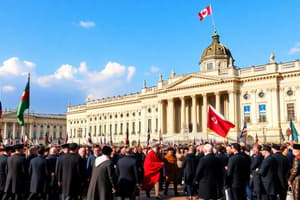Podcast
Questions and Answers
What is the significance of Otto Von Bismarck in the unification of Germany?
What is the significance of Otto Von Bismarck in the unification of Germany?
Otto von Bismarck played a central role in the unification of Germany as a prominent Prussian statesman and diplomat.
Define Realpolitik and explain how Otto Von Bismarck applied it in politics.
Define Realpolitik and explain how Otto Von Bismarck applied it in politics.
Realpolitik prioritizes practical and pragmatic considerations over ideological concerns. Bismarck used Realpolitik to achieve political objectives through calculated diplomacy and military force.
How did the Congress of Vienna contribute to the rise of nationalist movements in Europe?
How did the Congress of Vienna contribute to the rise of nationalist movements in Europe?
The emphasis on restoring old regimes and suppressing nationalist aspirations fueled resentment and resistance among nationalist groups.
Explain the process of German unification in the 19th century.
Explain the process of German unification in the 19th century.
What were the main consequences of the Congress of Vienna's system of conservative monarchies?
What were the main consequences of the Congress of Vienna's system of conservative monarchies?
How did Bismarck's pragmatic approach to politics differ from traditional ideological approaches?
How did Bismarck's pragmatic approach to politics differ from traditional ideological approaches?
How did Bismarck's 'Blood and Iron' speech emphasize the importance of military power in achieving German unification?
How did Bismarck's 'Blood and Iron' speech emphasize the importance of military power in achieving German unification?
What was the significance of the Franco-Prussian War in the process of German unification?
What was the significance of the Franco-Prussian War in the process of German unification?
How did nationalism serve as a driving force for German unification?
How did nationalism serve as a driving force for German unification?
What were the key roadblocks to German unification that Bismarck had to overcome?
What were the key roadblocks to German unification that Bismarck had to overcome?
What was the role of Otto von Bismarck in the process of German unification?
What was the role of Otto von Bismarck in the process of German unification?
How did Bismarck strategically exploit existing tensions and rivalries among the German states to advance Prussian dominance?
How did Bismarck strategically exploit existing tensions and rivalries among the German states to advance Prussian dominance?
What were the key steps Bismarck took to unite the German states under Prussian leadership?
What were the key steps Bismarck took to unite the German states under Prussian leadership?
How did the defeat of Austria in the Austro-Prussian War contribute to German unification?
How did the defeat of Austria in the Austro-Prussian War contribute to German unification?
What was the significance of the North German Confederation in the unification of Germany?
What was the significance of the North German Confederation in the unification of Germany?
How did Bismarck's 'Blood and Iron' speech reflect his philosophical approach to achieving political goals?
How did Bismarck's 'Blood and Iron' speech reflect his philosophical approach to achieving political goals?
What were the key factors that enabled Bismarck to successfully unify Germany under Prussian leadership?
What were the key factors that enabled Bismarck to successfully unify Germany under Prussian leadership?
How did the proclamation of the German Empire in 1871 mark the culmination of the unification process?
How did the proclamation of the German Empire in 1871 mark the culmination of the unification process?
Flashcards are hidden until you start studying




